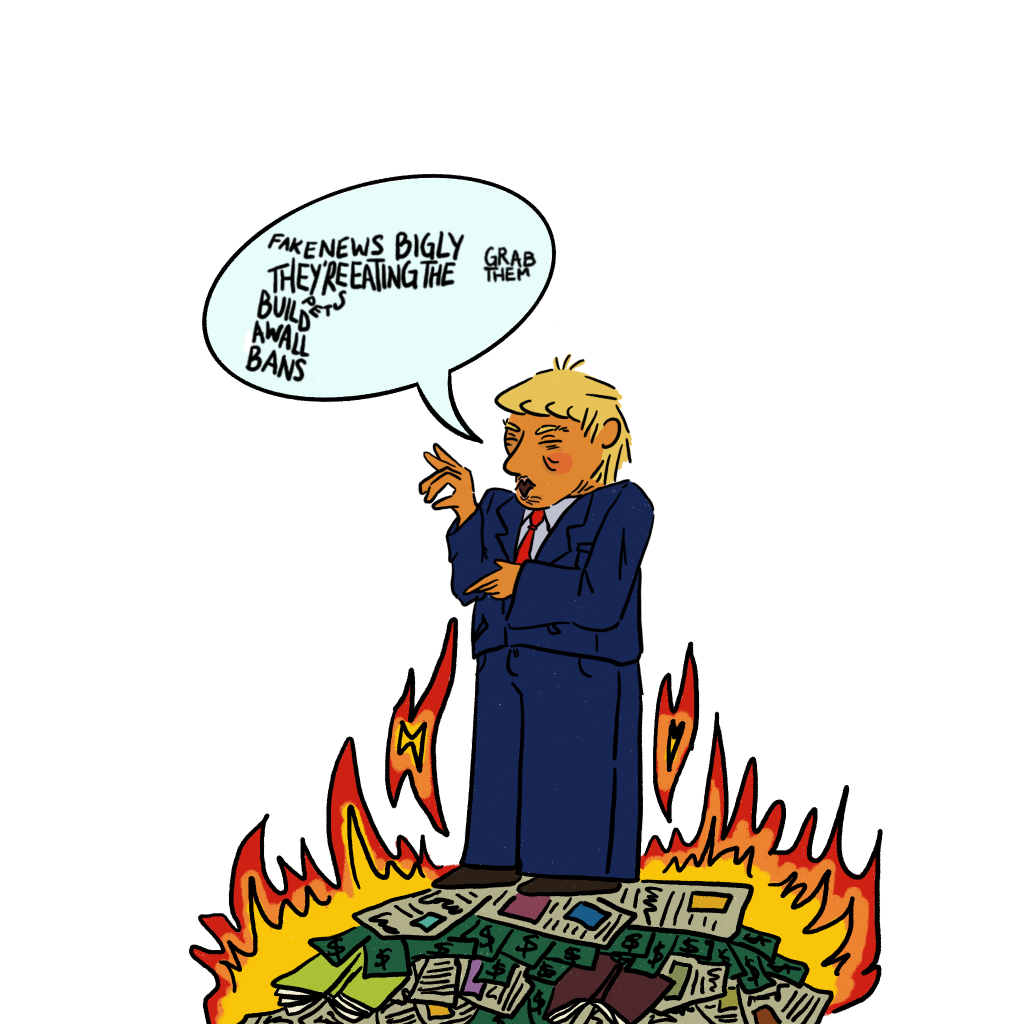“Eating Cats and Dogs”: How Lies Impact Lives

Image Description: Drawing of Donald Trump standing on a pile of newspapers, books, and money that is on fire. A speech bubble is above him, which contains some of his offensive quotes.
“In Springfield,” Donald Trump said during his first debate with then Vice President Kamala Harris, “they’re eating the dogs, the people that came in, they’re eating the cats… They’re eating the pets of people that live there.” Like many Americans, Harris laughed openly, dismissing this as another outlandish claim from her opponent. Audio clips of Trump’s debate performance were ridiculed — mocked by late-night hosts, lip-synced to on TikTok — but the militarized, anti-immigrant policies that have become a hallmark of the second Trump administration have made the violent ideology behind his comments impossible to dismiss.
The pet-eating rumor originated from a crime watch Facebook group post, in which a supposed Springfield resident claimed, without evidence, that a missing cat had been butchered by its owner’s Haitian neighbors. The story gained traction in right-wing circles, most notably when it was posted to X by Vice President-elect JD Vance. The rumor’s proliferation fueled rampant xenophobia and racism towards the roughly 20,000 Haitian immigrants living in Springfield, Ohio. It also tacitly reinforced the idea that mass deportations and other extreme anti-immigrant policies are necessary for public safety.
Springfield city officials reached out to multiple news outlets to insist that “no credible reports” exist to support Trump and Vance’s claims, and the Facebook user who originally shared the story has since expressed remorse and admitted her original post had no credible backing. Regrettably, this has not stopped the rumor from inciting violence towards immigrant communities. Amplified on a national stage by a presidential candidate, the lie scapegoated and vilified Haitians, immigrants, and anyone perceived as either. Springfield mayor Rob Rue told CNN that the city received over 35 threats of violence in the ten days following the presidential debate, including bomb threats leading to the elementary school evacuations. This turmoil has left many in the Haitian community fearing for their safety.
Vance has implied that although he is aware the pet-eating claims are false, he has continued circulating them to spark outrage in his constituents. At the time of the debate, Haitian immigrants had legally protected status in the United States. It is evident that the Trump administration’s anti-immigration campaign is not based on issues of immigrants’ legal status or public safety and is instead a weaponization of deep-seated xenophobia.
Inflammatory, anti-immigrant rhetoric has been a staple of Trump’s agenda since his first election cycle eight years ago, and Trump’s baseless debate-stage accusations are far from his first attack on Haitian immigrants. In a 2021 phone call with Fox News, the president accused Haitian immigrants of bringing AIDS into the United States. Three years earlier, he infamously described Haiti and other predominantly Black nations as “shithole countries.”
This calculated, derogatory language manifested in the enactment of several policies limiting Haitian migration into the United States. In January of 2018, for example, the Trump administration terminated Haiti’s temporary protected status (TPS), assigned by the Department of Homeland Security (DHS) for countries deemed unable to accept nationals overseas back within their borders.
TPS is often assigned to countries experiencing armed conflicts, natural disasters, and other difficulties that contribute to humanitarian crises. Although these criteria expressly describe conditions in Haiti, then DHS Deputy Secretary Elaine Duke ignored the Haitian embassy’s October 2017 request for a TPS extension under the Trump administration.
Haiti’s TPS was eventually reinstated by the Biden administration, but a second Trump presidency guarantees extreme limitations on immigration for the next four years. The unconstitutional attempt to rescind Americans’ birthright citizenship, the reversal of Biden administration protections, ICE raids on schools and churches, and deportations of shackled migrants on military planes executed by the Trump administration in under a month have dominated media cycles. The Trump administration’s actions and policies illustrate an unprecedented disregard for the livelihoods of everyone — citizen and non-citizen alike — on American soil.
The frighteningly widespread acceptance of these policies, as illustrated by Trump’s decisive victory in the popular vote last November, can be directly attributed to the systematic dehumanization of immigrants that his administration has worked tirelessly to proliferate. In this past election cycle, even Trump’s opponents replaced calls for immigration reform and descriptions of America as a “nation of immigrants” with calls for a “lethal” border. Immigration has been reframed as a fundamental and existential threat to American life that demands a violent, extreme, and deadly solution.
“They can’t even speak English,” Trump said during his September debate with Harris, “They don’t even know what country they’re in, practically.”
“No, they’re not humans, they’re not humans. They’re animals,” he told a Michigan crowd last April.
In 2023, the president went as far as to claim that immigrants are “poisoning the blood of our country,” phrasing frighteningly similar to that of Mein Kampf. Language describing immigrants as corrupt, impure, animalistic criminals echoes rhetoric historically used to justify slavery, genocide, and segregation. Once again, American leaders attempt to garner support through division, exploiting marginalized people to further their agendas through hate.
This systemic dehumanization of immigrants has not only fostered xenophobia in the United States; American policies play a prominent role in global politics, significantly influencing those of many neighboring countries. Following the United States’ 2019 termination of Haiti’s TPS, for example, the Bahamas passed legislation requiring the mass removal of undocumented immigrants in the country, a majority of whom are Haitian.
The recent influx of Haitian immigration to the United States and neighboring countries is the result of a longstanding humanitarian crisis in the country due to natural disasters, international interference, political instability, and rampant gang violence. This has left over 700,000 people displaced across the nation and placed Haitian children under severe threats of malnutrition and poverty.
Haiti has neither the capacity nor the resources to receive the influx of people that mass deportations promised by the Trump administration would spur. In October alone, the United States deported 258 Haitian people while Jamaica, the Bahamas, and Turks & Caicos combined deported 231. The Dominican Republic has promised to deport 10,000 Haitians a week. In February of 2025, Haitian TPS in the United States was officially revoked, forcing those who previously maintained protected status to return to Haiti by August.
The vulnerability of Haitians directly stems from decades of international interference by imperialist countries, including that by the United States. These targeted immigration policies only serve to endanger Haitian people globally and further worsen conditions in Haiti.
Xenophobic, racist comments made even offhandedly by those in power have tangible consequences that translate directly into harmful policy. As America stares down the barrel of the next four years with President Donald Trump — a man infamous for fabrication, discrimination, and embellishment — its citizens must broaden their focus from his words themselves to the lives they endanger.




